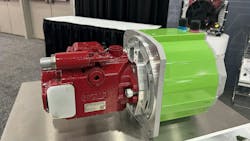From the Editor’s Desk: Battery Show Demonstrates Continued Opportunities in Electrification
I recently had the opportunity to attend The Battery Show and co-located Electric & Hybrid Vehicle Technology Expo (EV Tech Expo), which took place October 6-9 in Detroit, MI. It has been several years since I was last at this event, and it provided a great opportunity to not only learn more about battery and electrification technologies but also see how fluid power companies are working in this space.
What drew me back to the show this year was the number of hydraulics and pneumatics companies on the exhibitor list. Companies such as Bosch Rexroth, Husco, Hydac, Parker Hannifin, SMC Corp. and more showcased their solutions that can be used on electric vehicles (EV) of various types as well as those for producing batteries and other electrification technologies. It was nice to see both of the ways in which fluid power technologies are utilized within the electric vehicle industry — and thus the opportunities that exist in this expanding market.
View the below content to learn more about how the fluid power and electromechanical motion control industries are involved in the electrification market as well as the opportunities being realized within it.
How Hydraulic Systems are Evolving to Meet Electrification Requirements
Electrification Brings New Technology and Market Opportunities
The Impacts of Electrification on Fluid Power Systems
The State of Electrification: Slow but Continued Growth Ahead
In speaking with companies at The Battery Show, many said the electric vehicle space is still an active one. Although there has been some softening in the market this year, particularly in the passenger car segment, there is still a lot of activity in other sectors such as heavy-duty trucking and off-highway applications. In these industries, there is typically more of a business case for going to electric such as reduced maintenance and operational costs.
Interest in batteries and other electric vehicle technologies has not seemed to wane either, as evidenced by foot traffic at the show which was relatively steady during the 2 days I was at the event. On the first day the lines for parking and badge pickup were some of the longest I’ve experienced at an event in a long time, and companies I spoke to said they were having good conversations with visitors. However, there were also those who noted attendance felt lighter this year than the 2024 show with some speculating it could have to do with current market conditions as well as the fact several other trade shows were going on at the same time.
Many of the government incentives which had previously been in place no longer exist or will be ending soon, potentially dampening demand for electric vehicles as those incentives helped to offset initial costs associated with the purchase of an EV.
Tariffs are also presenting challenges for the market. Because many materials and components are produced in China and other Asian countries currently facing high tariff rates, companies are having to reassess their supply chains. As one manufacturer told me, they were utilizing the show to not only highlight how their technology is used in EVs but also to find potential domestic suppliers and production partners.
Despite the challenges, the overall consensus from those I spoke to was that there remain many opportunities in the electrification space which will continue to prompt new technological developments. These include the need for safety technology, on-board chargers and batteries capable of meeting the needs of the higher voltage systems entering the market as well as more automated production lines so manufacturers can increase productivity.
Is electrification an area in which your company is working? What developments or opportunities are you seeing in this market? Have application stories or topics related to electrification you’d like to see covered? Let me know by reaching out to me any time at [email protected].
About the Author
Sara Jensen
Executive Editor, Power & Motion
Sara Jensen is executive editor of Power & Motion, directing expanded coverage into the modern fluid power space, as well as mechatronic and smart technologies. She has over 15 years of publishing experience. Prior to Power & Motion she spent 11 years with a trade publication for engineers of heavy-duty equipment, the last 3 of which were as the editor and brand lead. Over the course of her time in the B2B industry, Sara has gained an extensive knowledge of various heavy-duty equipment industries — including construction, agriculture, mining and on-road trucks —along with the systems and market trends which impact them such as fluid power and electronic motion control technologies.
You can follow Sara and Power & Motion via the following social media handles:
X (formerly Twitter): @TechnlgyEditor and @PowerMotionTech
LinkedIn: @SaraJensen and @Power&Motion
Facebook: @PowerMotionTech

Leaders relevant to this article:


